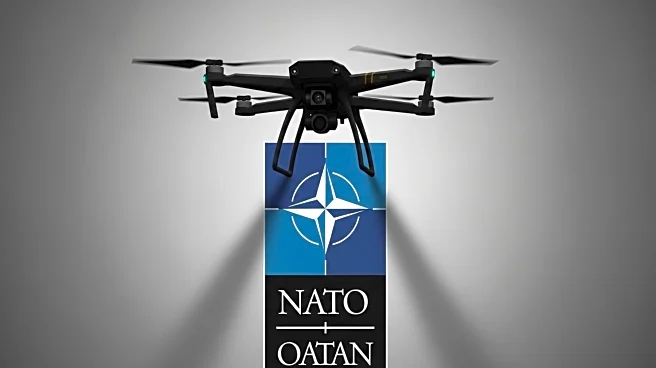What is the story about?
What's Happening?
Denmark is facing a series of disruptive drone flights near its airports and military installations, which Danish defense minister Troels Lund Poulsen has labeled as a 'hybrid attack.' The incidents have prompted Denmark to consider activating NATO's Article 4, which calls for consultations among NATO members if any party's territorial integrity, political independence, or security is threatened. The drone sightings occurred over several hours at Aalborg airport, causing its closure, and at smaller airports in Sønderborg and Esbjerg. Drones were also seen at Skrydstrup Air Station and the Jydske Dragoon Regiment barracks. Danish Prime Minister Mette Frederiksen has not ruled out Russian involvement, although Moscow denies responsibility. The incidents follow similar airspace violations reported by Poland, Romania, and Estonia.
Why It's Important?
The drone incidents in Denmark highlight the growing tension between NATO members and Russia, especially in the context of the ongoing conflict in Ukraine. These events underscore the vulnerability of critical infrastructure to hybrid attacks, which can include sabotage, disinformation, espionage, and cyberattacks. The situation raises concerns about the security of NATO countries and their ability to respond to unconventional threats. Denmark's consideration of activating NATO's Article 4 reflects the seriousness of the threat and the need for collective security measures. The incidents could influence NATO's strategic decisions and its support for Ukraine, as well as impact European security policies.
What's Next?
Denmark is in discussions with NATO and the EU regarding the drone incidents but has not yet decided to activate Article 4. The Danish government is likely to continue investigating the source of the drone flights and may enhance its defense capabilities, including acquiring long-range precision weapons. The situation may lead to increased security measures at airports and military installations across Europe. NATO's response to Denmark's situation could set a precedent for handling similar threats in the future, potentially leading to more coordinated defense strategies among member countries.
Beyond the Headlines
The drone incidents in Denmark may have broader implications for international relations and security policies. They highlight the challenges of addressing hybrid threats that blend traditional military tactics with cyber and information warfare. The events could prompt NATO to reassess its defense strategies and increase collaboration on cybersecurity and intelligence sharing. Additionally, the situation may influence public opinion on military spending and the role of NATO in ensuring European security.














